初二英语上学期Unit1 & Unit2
Unit1单元总结人教版八年级英语上册

八年级上册Unit 1 单元总结一、重点短语去度假go on vacation呆在家stay at home上山/进山go to the mountains到海边去go to the beach参观博物馆visit museums去夏令营go to the summer camp相当多quite a few为……学习study for出去go out大部分时间/绝大多数时间most of the time尝起来味道好taste good玩的开心have a good time / have fun当然可以of course感觉像……/想要feel like去购物go shopping在过去in the past绕……走walk around太多(可数名词前面)too many因为because of一碗…… one bowl of查出来/发现find out继续go on照相take photos重要的事情something important上上下下up and down上升,出来e up到达arrive in喜欢做某事enjoy doing sth.乘火车take the train第二天the next day......的顶部the top of继续做某事keep doing sth.决定去做某事decide to do sth.忘记去做某事forget to do sth.太......以至于...... so ... that二、重点句子Grammar Focus 句子1.—Where did you go on vacation?你到哪里去度假了?—I went to New York City.我去了纽约城。
2.—Did you go out with anyone?你和谁一起出去了吗?—No , no one was here. Everyone was on vacation.不,没有人在这儿。
八年级上册英语unit1-单词及语法讲解

❖ Maybe they’ll go skateboarding.
❖ He may know the answer.
❖ 15. although = though 虽然
❖ Although he’s ill, he goes to school on time
❖ 虽然他生病了, 但他还是准时上学。
❖ She eats a lot of chocolate, although she is very fat. 虽然她很胖大家,好但她却吃许多的巧克力8 。
❖ time表示不可数名词,意为“时间”。 表示可 数名词,意为“次数,倍数”
❖ What time is it?
❖ I go to the movies three times a week. ❖ 注意“次数”的表达方法 ❖ 一次 once, 两次 twice, ❖ 三次或三次以上用基数词加上times: ❖ three times、five times、
❖
我将在这呆一段时间。
❖
He worked for that company for some time.
❖
他为那家电脑公司工作了一阵子。
❖ (3) some times是名词词组,意为“几次,几倍”
❖ I met him some times in the street last month.
❖
上个月我在街上遇到他好几次了。
I want you to help me with my math. 我想要你帮我学数学。
有很多动词后面用这种结构做动词的复合宾语:
ask sb. to do sth. 叫某人做某事
tell sb. to do sth. 告诉某人去做某事
八年级上册英语unit1重点单词
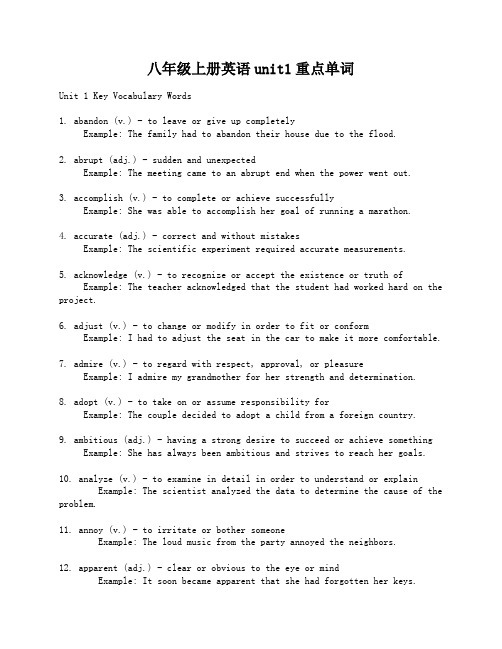
八年级上册英语unit1重点单词Unit 1 Key Vocabulary Words1. abandon (v.) - to leave or give up completelyExample: The family had to abandon their house due to the flood.2. abrupt (adj.) - sudden and unexpectedExample: The meeting came to an abrupt end when the power went out.3. accomplish (v.) - to complete or achieve successfullyExample: She was able to accomplish her goal of running a marathon.4. accurate (adj.) - correct and without mistakesExample: The scientific experiment required accurate measurements.5. acknowledge (v.) - to recognize or accept the existence or truth ofExample: The teacher acknowledged that the student had worked hard on the project.6. adjust (v.) - to change or modify in order to fit or conformExample: I had to adjust the seat in the car to make it more comfortable.7. admire (v.) - to regard with respect, approval, or pleasureExample: I admire my grandmother for her strength and determination.8. adopt (v.) - to take on or assume responsibility forExample: The couple decided to adopt a child from a foreign country.9. ambitious (adj.) - having a strong desire to succeed or achieve somethingExample: She has always been ambitious and strives to reach her goals.10. analyze (v.) - to examine in detail in order to understand or explainExample: The scientist analyzed the data to determine the cause of the problem.11. annoy (v.) - to irritate or bother someoneExample: The loud music from the party annoyed the neighbors.12. apparent (adj.) - clear or obvious to the eye or mindExample: It soon became apparent that she had forgotten her keys.13. approach (v.) - to come near or closer to something or someoneExample: We approached the house cautiously, unsure of what we would find inside.14. appropriate (adj.) - suitable or proper in the circumstancesExample: It is important to wear appropriate clothing for a job interview.15. approve (v.) - to officially agree or accept somethingExample: The committee approved the new budget proposal.16. argue (v.) - to give reasons or evidence in support of an idea or beliefExample: The students argued their case for having longer lunch breaks.17. arrogant (adj.) - having an exaggerated sense of one's own importance or abilitiesExample: His arrogant behavior made it difficult for others to work with him.18. artificial (adj.) - made or produced by human beings rather than occurring naturallyExample: The flowers in the vase were beautiful, but they were artificial.19. assistance (n.) - help or support provided to someoneExample: The school offered tutoring as an assistance to struggling students.20. assure (v.) - to inform or tell someone confidently or positivelyExample: The doctor assured the patient that the test results were normal.21. attach (v.) - to connect or join something to something elseExample: She attached a photo to her email for added context.22. attribute (v.) - to say that a quality, action, or state is caused by a particular person or thingExample: The artist attributes her success to years of hard work and dedication.23. aware (adj.) - knowing that something exists or is happening; having knowledge or recognition ofExample: The community became aware of the environmental issues affecting their area.24. benefit (v.) - to be helpful or advantageous to someone or somethingExample: Eating a healthy diet can benefit your overall well-being.25. belong (v.) - to be a part of a group, organization, or familyExample: This book belongs to the school library.26. bias (n.) - a preference or an inclination for or against someone or somethingExample: The study had a bias towards the new treatment due to the researcher's interest.27. beside (prep.) - next to or alongside something or someoneExample: She sat beside her friend during the movie.28. beneath (prep.) - under or below somethingExample: The treasure was hidden beneath the floorboards.29. besides (adv.) - in addition to; apart fromExample: Besides English, she also speaks Spanish and French.30. bias (v.) - to show a preference or an inclination for or against someone or somethingExample: The media outlet was biased in its reporting of the political event.31. bind (v.) - to attach or fasten somethingExample: The thread binds the edges of the book.32. both (adj./pron.) - applied to two people or things and indicating that they are equally includedExample: Both students received the highest award for their achievements.33. brief (adj./v.) - short and concise; to give a short summary or explanation of somethingExample: The lawyer gave a brief summary of the case to the jury.34. bright (adj.) - having a high degree of light or color; intelligent or talentedExample: The student's bright ideas helped solve the complex problem. 35. bring (v.) - to take or come to a particular place with someone or somethingExample: She brought her dog to the park for a walk.36. broad (adj.) - large in extent or range; not limited or restrictedExample: The conference covered a broad range of topics related to education.37. build (v.) - to construct or create somethingExample: The construction workers built a new school building.38. bureau (n.) - a government department or agencyExample: The FBI is the bureau responsible for investigating federal crimes.39. busy (adj.) - engaged in activity; having a lot of things to doExample: She is too busy with work to attend the event.40. capable (adj.) - having the ability to do something wellExample: The chef is capable of creating delicious dishes.。
人教版八年级英语上册unit1-10知识点总结

知识点8上unit1paragliding n.滑翔伞运动trader n.商人visit sb 看望某人visit sp 游览某地visitor 游客anyone=anybody 有人,任何人否定,疑问句代替someone/somebody肯句:任何人anyone 指人不指物后不接ofany one指人/物“任何一个”后可接of短语anyone做主,谓动单Anyone in my class knows any one of the singers and any one of their songs.adj.修饰不定代要后置anything special作定adj./to do 放在复合不定代词后复合不定代词作主语,谓语动词用单数some-肯定句any-否,疑。
疑中希望得到肯定回答用some-。
肯定句anyone任何人anything任何事接双宾buy sb. Sth.动词间宾直宾buy sth. to sb,直宾间宾直宾的代词只能用有to的形式give tell sell bring send pass show teachsend...to... 把...寄给... send for 派人去请You should send for a doctor.take a photo/photos of sb./sth. quite a few 相当多修饰cn. quite a little un.a little 修饰un./v./adj./adv.too many 修饰cn.复"太多" too much 修饰un. 修饰v.作状“太多”much too 修饰adj./adv."太" most of the time 大部分时间most of...做主谓看most of 后n./pronmost of us are...Most of the food goes bad.have a good time doing sth.How do you like =How do you feel about =What do you think ofgo sightseeing 去观光go surfing 去冲浪go skateboarding 去进行滑板运动go online 去上网(U2)Sometimes I go online for fun.有时我上网娱乐。
人教版八年级上册英语第一单元Unit1《重要知识点》汇总总结
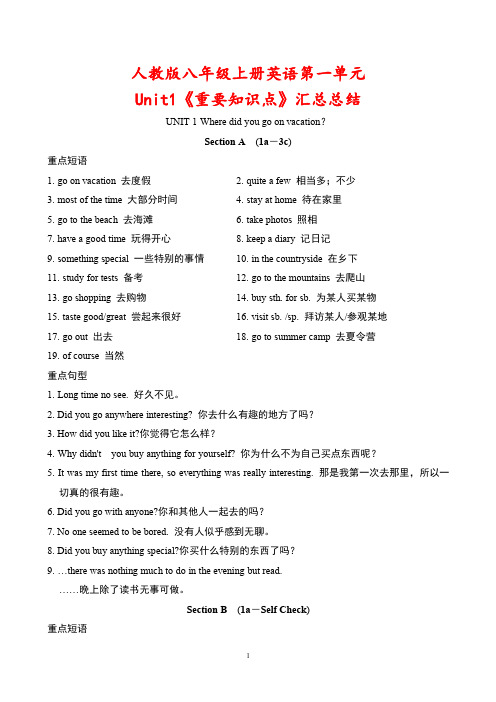
人教版八年级上册英语第一单元Unit1《重要知识点》汇总总结UNIT 1 Where did you go on vacation?Section A(1a-3c)重点短语1. go on vacation 去度假2. quite a few 相当多;不少3. most of the time 大部分时间4. stay at home 待在家里5. go to the beach 去海滩6. take photos 照相7. have a good time 玩得开心8. keep a diary 记日记9. something special 一些特别的事情10. in the countryside 在乡下11. study for tests 备考12. go to the mountains 去爬山13. go shopping 去购物14. buy sth. for sb. 为某人买某物15. taste good/great 尝起来很好16. visit sb. /sp. 拜访某人/参观某地17. go out 出去18. go to summer camp 去夏令营19. of course 当然重点句型1. Long time no see. 好久不见。
2. Did you go anywhere interesting? 你去什么有趣的地方了吗?3. How did you like it?你觉得它怎么样?4. Why didn't you buy anything for yourself? 你为什么不为自己买点东西呢?5. It was my first time there, so everything was really interesting. 那是我第一次去那里,所以一切真的很有趣。
6. Did you go with anyone?你和其他人一起去的吗?7. No one seemed to be bored. 没有人似乎感到无聊。
八年级上册英语第一单元unit1知识点及练习题
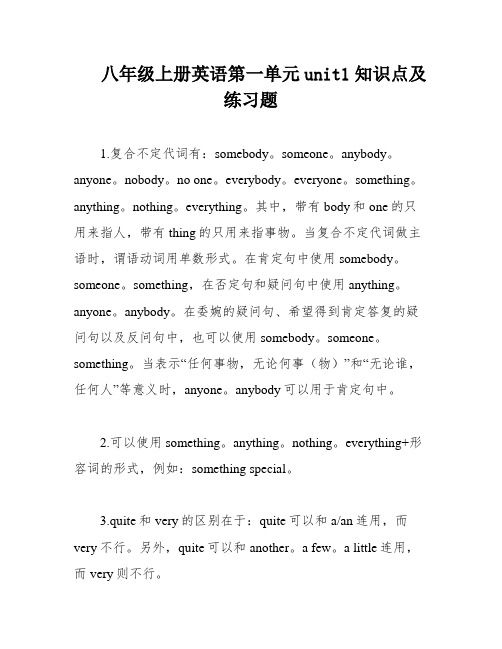
八年级上册英语第一单元unit1知识点及练习题1.复合不定代词有:somebody。
someone。
anybody。
anyone。
nobody。
no one。
everybody。
everyone。
something。
anything。
nothing。
everything。
其中,带有body和one的只用来指人,带有thing的只用来指事物。
当复合不定代词做主语时,谓语动词用单数形式。
在肯定句中使用somebody。
someone。
something,在否定句和疑问句中使用anything。
anyone。
anybody。
在委婉的疑问句、希望得到肯定答复的疑问句以及反问句中,也可以使用somebody。
someone。
something。
当表示“任何事物,无论何事(物)”和“无论谁,任何人”等意义时,anyone。
anybody可以用于肯定句中。
2.可以使用something。
anything。
nothing。
everything+形容词的形式,例如:something special。
3.quite和very的区别在于:quite可以和a/an连用,而very不行。
另外,quite可以和another。
a few。
a little连用,而very则不行。
4.few表示否定意义的可数名词复数,a few表示肯定意义的可数名词复数,little表示否定意义的不可数名词,XXX表示肯定意义的不可数名词。
5.what about和how about都可以表示询问“做…怎么样”,后面接动词ing形式。
6.seem和look的区别在于:seem暗示有一定根据的判断,look指由视觉而得出的印象。
7.XXX形容人感到无聊,XXX形容物使人感到无聊。
8.arrive at用于小地方,arrive in用于大地方。
9.decide to do sth和make up one's mind to do sth都表示“决定做某事”。
八年级上册英语unit1
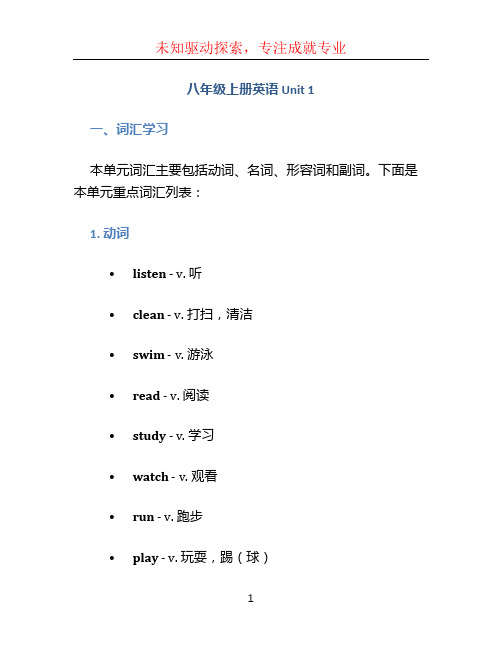
八年级上册英语 Unit 1一、词汇学习本单元词汇主要包括动词、名词、形容词和副词。
下面是本单元重点词汇列表:1. 动词•listen - v. 听•clean - v. 打扫,清洁•swim - v. 游泳•read - v. 阅读•study - v. 学习•watch - v. 观看•run - v. 跑步•play - v. 玩耍,踢(球)2. 名词•school - n. 学校•class - n. 班级,课程•desk - n. 书桌•book - n. 书籍•notebook - n. 笔记本•friend - n. 朋友•teacher - n. 老师•student - n. 学生3. 形容词•happy - adj. 高兴的•good - adj. 好的•busy - adj. 忙的•interesting - adj. 有趣的•difficult - adj. 困难的•tall - adj. 高的•short - adj. 矮的•smart - adj. 聪明的4. 副词•usually - adv. 通常地•quite - adv. 相当地•often - adv. 经常地•never - adv. 从不,永不二、语法学习本单元的重点语法是一般现在时(Simple Present Tense)。
一般现在时表示经常性的动作、习惯行为、客观事实或现状。
下面是一般现在时的基本结构:•肯定句:主语 + 动词原形(第三人称单数要加-s)•否定句:主语 + do/does not + 动词原形•疑问句:(特殊疑问词)+do/does + 主语 + 动词原形例如: - 肯定句:I play basketball every Sunday.(我每个星期天打篮球。
) - 否定句:She does not like apples.(她不喜欢苹果。
) - 疑问句:Do they watch movies on weekends?(他们周末看电影吗?)三、交际用语1.问候–Hello!(你好!)–Hi!(嗨!)–How are you?(你好吗?)2.自我介绍–My name is…(我的名字是…)–I am…(我是…)–Nice to meet you!(很高兴认识你!)3.询问兴趣爱好–What do you like?(你喜欢什么?)–Do you like swimming?(你喜欢游泳吗?)–What is your favorite sport?(你最喜欢的运动是什么?)4.表达喜好–I like…(我喜欢…)–My favorite subject is English.(我最喜欢的科目是英语。
八年级英语上册“Unit 1”必背知识点
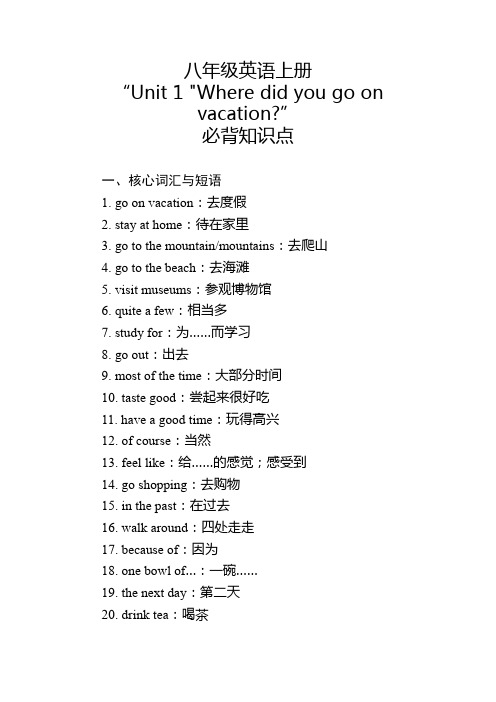
八年级英语上册“Unit 1 "Where did you go onvacation?”必背知识点一、核心词汇与短语1. go on vacation:去度假2. stay at home:待在家里3. go to the mountain/mountains:去爬山4. go to the beach:去海滩5. visit museums:参观博物馆6. quite a few:相当多7. study for:为……而学习8. go out:出去9. most of the time:大部分时间10. taste good:尝起来很好吃11. have a good time:玩得高兴12. of course:当然13. feel like:给……的感觉;感受到14. go shopping:去购物15. in the past:在过去16. walk around:四处走走17. because of:因为18. one bowl of…:一碗……19. the next day:第二天20. drink tea:喝茶21. find out:找出;查明22. take photos:照相23. something important:重要的事二、重点句型与结构1. 询问过去的行动:Where did you go on vacation? 你假期去哪里了?What did you do last weekend? 上周末你做了什么?2. 回答过去的行动:I went to the mountains. 我去爬山了。
We visited the museum. 我们参观了博物馆。
3. 描述过去的感受或状态:It was wonderful. 太棒了。
I felt like I was a bird. 我感觉自己像一只鸟。
4. 表示过去的频率或习惯:I usually went shopping with my mom. 我通常和我妈妈一起去购物。
八年级英语上册Unit1知识点归纳

八年级英语上册Unit1知识点归纳八年级英语上册Unit1学问点第一单元主要点:①复习一般过去时②复合不定代词的用法③反身代词的用法④系动词的用法⑤动词后的”t d和ding 的区分⑥ed形容词和ing形容词的区分⑦“近义词”的区分⑧本单元中的主谓全都现象⑨动词过去式的构成及不规章动词表⑩用同义短语转换同义句时谓语动词形式全都性的培育。
⑾感慨句的构造和连词的选择。
一、词组、短语:1、g n vacatin去度假,2、 sta at he 呆在家,3、g t the untains 上山/进山,4、 g t the beach到海边去,5、visit useus 参观博物馆,6、g t suer cap 去夏令营,7、 quite a fe而且由于坏天气,我们也没能看到下面的任何风光(P5)辨析:because f与becausea. because f意为“由于,由于”,后可接名词、代词或动名词,不能接句子。
He lst his b because f his age.b. because意为“由于”,引导状语从句,即接句子。
I didn’t bu the shirt because itfrget ding sth. 意为“遗忘做过某事(事情已经做过了)” eg: I frget clsing the15. Abut ne hur later, 教师刚刚告知我们擦窗户。
2)eep ding sth. 意为“连续做某事,始终做某事”。
She TV fr tw hurs last night. 昨晚她持续看了两个小时的电视。
23. Everne uped up and dwn in exciteent. 大家都兴奋地跳起来。
(P8)up and dwn 意为“上上下下;来来回回”,在句中作状语。
22. 反身代词:self , urselves, urself , urselves, hiself,herself, itself, theselves.作动词或介词的宾语:常常在en, teach, hurt, bu, intrduce, dress, ill等动词和b, fr, t, f等介词后作宾语。
(完整版)人教版八年级上册英语unit1知识点及习题

Unit1 Where did you go on vacation一、书本重要语法点梳理go on vacation去度假 stay at home待在家里go to the mountains去爬山 go to the beach去海滩visit museums 参观博物馆 go to summer camp去参观夏令营quite a few相当多 study for为……而学习go out出去most of the time大部分时间taste good尝起来很好吃 have a good time玩得高兴]of course当然feel like给……的感觉;感受到go shopping去购物in the past在过去walk around四处走走because of因为one bowl of…一碗…… the next day第二天drink tea喝茶find out找出;查明go on继续 take photos照相something important重要的事 up and down上上下下come up出来buy sth. for sb. / buy sb. sth.为某人买某物taste + adj. 尝起来…… look+adj. 看起来……nothing…but+动词原形除了……之外什么都没有seem+(to be)+ adj. 看起来……arrive in+大地点 / arrive at+小地点到达某地decide to do sth.决定去做某事try doing sth.尝试做某事 try to do sth.尽力去做某事forget doing sth.忘记做过某事 forget to do sth.忘记做某事enjoy doing sth.喜欢做某事 want to do sth.想去做某事start doing sth.开始做某事 stop doing sth. 停止做某事dislike doing sth. 不喜欢做某事keep doing sth.继续做某事Why not do. sth.为什么不做……呢so+adj.+that+从句如此……以至于……tell sb. (not) to do sth. 告诉某人(不要)做某事1. on vacation 度假vacation意为“假期、假日”,相当于holiday,但vacation 表示长的假期。
(完整版)新人教版八年级英语上册unit1知识点总结

Unit 1 where did you go on vacation ➢单词复习:任何人Anywhere 精彩的;极好的最多的;大多数的没有什么n.没有。
每人;人人.我自己你自己;你亲自hen pig似乎;好像无聊的;厌烦的;郁闷的Someone Diary 活动;活跃。
决定;选定Paragliding bird bicycle building trader惊奇;想知道;怀疑差异;不同顶部;顶等;等待湿的;雨天的低于;在。
..下面饥饿的;渴望的如同;像.。
一样HillDuck不喜欢;厌恶短语归纳1、go on vacation去度假 ,2、stay at home 呆在家,3、go to the mountains 上山/进山,4、go to the beach到海边去,5、visit museums 参观博物馆,6、go to summer camp 去夏令营,7、quite a few 相当多,8、study for为……学习,9、go out 出去,10、most of the time 大部分时间/绝大多数时间,11、taste good 尝起来味道好,12、have a good time玩的开心,13、of course当然可以,14、feel like(doing sth)感觉像……/想要,15、go shopping购物,16、in the past 在过去,17、walk around绕……走,18、too many 太多(可数名词前面),19、because of 因为,20、one bowl of 一碗……,21、find out 查出来/发现,22、go on继续,23、take photos 照相,24、something important重要的事情,25、up and down上上下下,26、come up出来➢习惯用法、搭配1. buy sth。
for sb.=buy sb. sth。
苏教版八年级上册英语unit1知识点
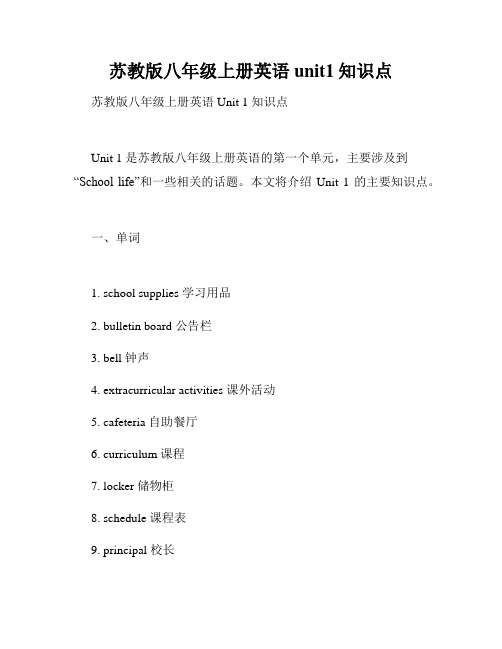
苏教版八年级上册英语unit1知识点苏教版八年级上册英语Unit 1 知识点Unit 1 是苏教版八年级上册英语的第一个单元,主要涉及到“School life”和一些相关的话题。
本文将介绍Unit 1 的主要知识点。
一、单词1. school supplies 学习用品2. bulletin board 公告栏3. bell 钟声4. extracurricular activities 课外活动5. cafeteria 自助餐厅6. curriculum 课程7. locker 储物柜8. schedule 课程表9. principal 校长10. student council 学生会二、短语1. go to school 上学2. have classes 上课3. study hard 努力学习4. take notes 记笔记5. join a club 参加俱乐部6. play sports 运动7. eat lunch 吃午饭8. make friends 交朋友9. do homework 做作业10. get good grades 取得好成绩三、语法1. 一般现在时一般现在时表示经常性或习惯性的行为,以及真理和事实。
例如:I go to school every day.(我每天上学)2. 物主代词物主代词用来表示所属关系。
例如:This is my book.(这是我的书)3. 不定冠词不定冠词指代未被确定的人或物。
例如:I have a pen.(我有一支笔)4. 介词 ofof 用来表示所属关系或从属关系。
例如:The name of the school is Lincoln Middle School.(这个学校的名字是林肯中学)四、对话本单元的对话主要围绕 School life 展开,包括上课、吃饭、课外活动等。
例如:A: Hi, Tom. What do you have first period?B: Hi, Li. I have English. What about you?A: I have math. Do you like English?B: Yes, it's my favorite subject. Do you like math?A: No, I don't like it at all. But I have to study hard for the test tomorrow.B: Good luck with that.五、阅读本单元的阅读材料包括一篇有关“校园活动”的文章,以及一个有关校规的表格,并要求学生根据表格内容写一篇短文。
人教版初二(上)英语第1讲:unit 1 词汇篇

八年级上册第一单元Unit 1 词汇篇1.复合不定代词:somebody某人someone某人anybody任何人anyone任何人nobody没人no one没人ererybody每个人ereryone每个人something某物anything任何事物nothing没有什么ererything一切事物①有body和one的只用来指人②有thing的只用来指事物③复合不定代词做主语时,谓语动词用单数形式④somebody,someone,something用于肯定句,anything,anyone,anybody用于否定句,疑问句⑤表示请求、邀请、提建议等带有委婉的语气的疑问句,和希望得到对方肯定答复的疑问句,以及表示反问的问句中,也用somebody,someone,something⑥anything表示“任何事物,无论何事(物)”, anyone,anybody表示“无论谁,任何人”等意义时,他们也可以用于肯定句中。
2. something、anything、nothing、everything+形容词,例如:something special3.quite和very的区别①quite+a/an, a/an+very②quite+ another, a few , a little ,不能用very4.few,a few, little, a little的区别few,可数名词复数,表否定a few,可数名词复数,表肯定little,不可数名词,表否定a little,不可数名词,表肯定5.what about=how about 做…怎么样后面加动词ing形式6.seem和look的区别Seem暗示有一定根据的判断,look指由视觉而得出的印象7.bored形容人无聊或是对。
感到无聊boring形容物无聊或者是使。
感到无聊8.arrive at+小地方arrive in+大地方9.dicide to do sth=make up one′s mind to do sth决定做某事10.feel like 感觉像,后面接动词ing形式11.over超过=more than12.enough 足够的,enough+名词副词+enough13.because和because of的区别Because后面接的是一个句子,because of后面接单词或者短语14.below 在…下面,反义词above15.forget to do sth忘记去做某事(这件事还没有做)forget doing sth忘记做过某事(这件事做过了,却忘记了)16.find out找到,发现,强调找的结果;look for寻找,强调找的过程17.so…that…如此…以至于=too … to…=enough …to1. Why not ask to help you?A. everyoneB. anyoneC. someoneD. no one解析:somebody,someone,something用于肯定句,anything,anyone,anybody用于否定句,疑问句,但是表示请求、邀请、提建议等带有委婉的语气的疑问句,和希望得到对方肯定答复的疑问句,以及表示反问的问句中,也用somebody,someone,something,故选C。
八年级上册英语unit1单词
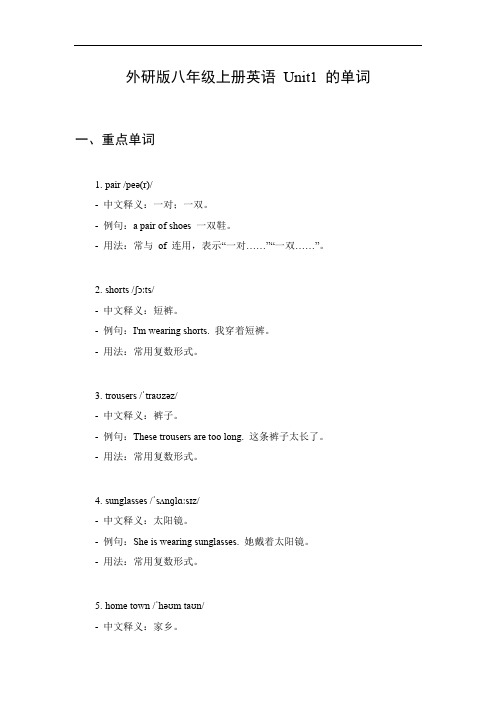
外研版八年级上册英语Unit1 的单词一、重点单词1.pair /peə(r)/-中文释义:一对;一双。
-例句:a pair of shoes 一双鞋。
-用法:常与of 连用,表示“一对……”“一双……”。
2.shorts /ʃɔːts/-中文释义:短裤。
-例句:I'm wearing shorts. 我穿着短裤。
-用法:常用复数形式。
3.trousers /ˈtraʊzəz/-中文释义:裤子。
-例句:These trousers are too long. 这条裤子太长了。
-用法:常用复数形式。
4.sunglasses /ˈsʌnɡlɑːsɪz/-中文释义:太阳镜。
-例句:She is wearing sunglasses. 她戴着太阳镜。
-用法:常用复数形式。
5.home town /ˈhəʊm taʊn/-中文释义:家乡。
-例句:My home town is a beautiful place. 我的家乡是一个美丽的地方。
-用法:由“home”和“town”两个单词组成的复合词。
6.friendly /ˈfrendli/-中文释义:友好的。
-例句:She is very friendly. 她很友好。
-用法:是形容词,可用来修饰人或物。
7.famous /ˈfeɪməs/-中文释义:著名的。
-例句:Beijing is famous for the Great Wall. 北京因长城而著名。
-用法:be famous for 因……而著名;be famous as 作为……而著名。
8.than /ðæn; ðən/-中文释义:比。
-例句:He is taller than me. 他比我高。
-用法:用于比较级中。
9.wide /waɪd/-中文释义:宽的;宽阔的。
-例句:The river is very wide. 这条河很宽。
-用法:是形容词,可用来修饰名词。
八上英语一单元知识点
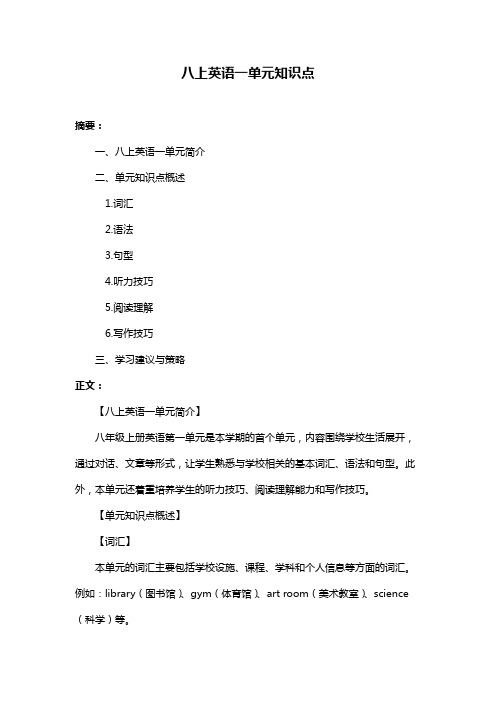
八上英语一单元知识点摘要:一、八上英语一单元简介二、单元知识点概述1.词汇2.语法3.句型4.听力技巧5.阅读理解6.写作技巧三、学习建议与策略正文:【八上英语一单元简介】八年级上册英语第一单元是本学期的首个单元,内容围绕学校生活展开,通过对话、文章等形式,让学生熟悉与学校相关的基本词汇、语法和句型。
此外,本单元还着重培养学生的听力技巧、阅读理解能力和写作技巧。
【单元知识点概述】【词汇】本单元的词汇主要包括学校设施、课程、学科和个人信息等方面的词汇。
例如:library(图书馆)、gym(体育馆)、art room(美术教室)、science (科学)等。
【语法】本单元的语法主要涉及一般现在时和现在进行时的用法。
通过学习,学生将了解到一般现在时用于描述经常发生的动作或状态,而现在进行时则表示正在进行的动作。
【句型】本单元句型主要包括日常交流中的问候、介绍、询问和表达看法等。
如:What"s your name?(你叫什么名字?)、What grade are you in?(你在几年级?)等。
【听力技巧】通过本单元的学习,学生将能听懂与学校生活相关的简单对话和问题,并能够根据所听内容进行信息筛选和判断。
【阅读理解】本单元的学习材料包括对话和文章,学生将学会通过阅读理解文章内容,回答问题和解决问题。
此外,还将培养学生的速读和略读技巧,提高阅读效率。
【写作技巧】本单元将教授学生如何根据提示进行信息整合,完成简单的书信和日记写作。
例如,以向新同学介绍自己和学校为主题的写作。
【学习建议与策略】针对本单元的学习内容,建议学生在课前预习词汇和语法,课堂上积极参与讨论和互动,课后进行复习巩固。
通过听说读写等多方面的练习,提高英语综合能力。
八年级上册英语unit1

八年级上册英语 Unit 11. IntroductionThe Unit 1 of the Eighth Grade English curriculum is an important part of the syllabus. This unit focuses on various topics, including introducing oneself and others, asking and answering questions about personal information, and talking about family and friends. In this unit, students will enhance their understanding of basic English grammar, expand their vocabulary, and improve their communication skills through various activities and exercises.2. Learning ObjectivesUpon completion of this unit, students will be able to:•Introduce themselves and others using appropriate greetings and expressions.•Use simple sentences to ask and answer questions about personal information.•Describe family members and friends using basic adjectives and possessive pronouns.•Engage in dialogues and conversations related to personal information, family, and friends.•Understand and apply basic grammar rules, including subject-verb agreement and the use of possessive adjectives.•Expand vocabulary related to family and personal information.3. VocabularyThis unit introduces several important vocabulary words related to personal information, family, and relationships. Some of the key vocabulary words include:1.Greet - to say hello or welcome someone.2.Introduce - to present or make someone known to others.rmation - facts or details about someone or something.4.Family - a group consisting of parents and their children, livingtogether as a unit.5.Friend - a person with whom one has a bond of mutual affection,typically one exclusive of sexual or familial relations.6.Question - a sentence worded or expressed so as to elicit information.7.Answer - a spoken or written reply or response to a question, request,letter, etc.4. GrammarThe Unit 1 also covers various grammar topics that are essential for effective communication in English. Some of the main grammar points emphasized in this unit are:Subject-Verb AgreementIn English grammar, the subject and verb must agree in number and person. If the subject is singular, the verb must also be singular, and if the subject is plural, the verb must be plural as well. For example:•She is my friend. (singular subject)•They are my friends. (plural subject)Possessive AdjectivesPossessive adjectives are used to show ownership or possession. The possessive adjectives in English are。
八年级上册英语unit1 单词用法分类归纳

Unit. 1 Where did you go on vacation? 名词1.hen [hen] n.母鸡I fed some hens on the farm.我在农场喂了几只鸡。
2 . pig n.猪I saw some pigs on the farm.我在农场看见几头猪。
3. diary ['daɪəri] n.日记;记事簿diariesI keep diaries every day.我每天记日记。
4.activity [æk'tɪvəti] n.活动activitiesOur school has a lot of activities every year.每年我们学校都举行许多活动。
5.bird [bɜːd] n.鸟I want to keep a bird.我想养一只鸟。
I want to fly like a bird.我想像鸟一样飞。
6.bicycle ['baɪsɪkl] n.自行车I ride my bicycle to school every day.我每天骑自行车去上学。
7.building ['bɪldɪŋ] n.建筑物;房子buildingsThere are many tall buildings in our city.在我们的城市有许多高大的建筑物。
8.trader ['treɪdə(r)] n.商人I want to be a trader when I grow up.当我长大我想成为一名商人9.difference ['dɪfrəns] n.差异;差别differencesI can’t find any differences between them.我找不到他们之间任何的差别。
10.top [tɒp] n.顶部;表面There is a small house on the top of the hill在山顶有一所小房子11.umbrella [ʌm'brelə] n.伞;雨伞an umbrella You should take an umbrella with you.你应该随身带一把雨伞。
人教版八年级英语上册:Unit1Wheredidyougoonvacation-讲义(含答案)

学科:英语专Unit 1 Where did you go on vacati on题:题一题面---Did you go to Guizhou with ______ ?---Yes, I went there with my family.A. some oneB. anyoneC. every oneD. no one复合不定代词指代人:some one, anyone, no one, every one,somebody, an ybody, n obody, everybody指代事物:someth ing, anything, nothing, everyth ing用something, anything, nothing, everything 填空。
---Is there ___________ on my no se?---Yes, there is ____________on your no se. Its a fly! anything何时用于肯定句?You can ask me anything you want to know.当形容词修饰不定代词时……---Come here, I ' II tell you something interesting.---Did you buy anything special?---Yes, I bought a pet spider.---Did you see _____ in your class?---No, I know all of them.A. some one newB. new some one题二题面I _________________ my uncle on vacation.我在假期去看望了叔叔。
I visit my grandparents once a week. 我每周都去爷爷奶奶一次。
仁爱版八年级上册英语unit1知识点

仁爱版八年级上册英语unit1知识点在仁爱版八年级上册,unit1的内容主要涉及到以下几个知识点:一、动词时态在英语中,动词的时态是非常重要的。
在unit1中,我们学习到了以下几种时态:1. 现在时:表示当前正在进行的动作或者状态。
例如:“I am reading a book.”(我正在读一本书)2. 过去时:表示已经发生过的动作或者状态。
例如:“Yesterday, I went to the cinema.”(昨天,我去了电影院)3. 将来时:表示将要发生的动作或者状态。
例如:“We will have a party tomorrow.”(明天我们将开个派对)二、人称代词人称代词是指代替人或者事物的代词。
在unit1中,我们学习到了以下几种人称代词:1. 主格:I, you, he, she, it, we, they2. 宾格:me, you, him, her, it, us, them3. 所有格:my/mine, your/yours, his, her/hers, its, our/ours,their/theirs三、形容词比较级和最高级在英语中,形容词有比较级和最高级的变化形式。
在unit1中,我们学习到了以下几种形容词比较级和最高级:1. 比较级的变化形式:在形容词前加more或者-er。
例如:“The blue dress is prettier than the green one.”(蓝色的裙子比绿色的漂亮)2. 最高级的变化形式:在形容词前加the most或者-est。
例如:“He is the tallest boy in the class.”(他是班上最高的男生)四、情态动词情态动词是指表示语气、态度和情感的动词。
在unit1中,我们学习到了以下几种情态动词:1. can:表示能力或者许可。
例如:“I can swim.”(我会游泳)2. may:表示允许或者可能。
- 1、下载文档前请自行甄别文档内容的完整性,平台不提供额外的编辑、内容补充、找答案等附加服务。
- 2、"仅部分预览"的文档,不可在线预览部分如存在完整性等问题,可反馈申请退款(可完整预览的文档不适用该条件!)。
- 3、如文档侵犯您的权益,请联系客服反馈,我们会尽快为您处理(人工客服工作时间:9:00-18:30)。
Phrases of Unit 1 Topic 11.see sb. do sth. 看见某人(经常)做某事2.see sb. doing sth. 看见某人(正在)做某事3.during the summer holidays 在暑假期间4.be going to+ 动词原形(构成一般将来时)打算,准备好要做某事5.cheer sb. on 为…加油6.Which …do you prefer,…or…? …和…你更喜欢哪一个?7.prefer sth. to sth. 喜欢…胜于…8.prefer doing sth. 喜欢…9.quite a lot = quite a bit 许多,大量10.join the club 加入俱乐部11.join sb. 加入某人的行列;和某人一起12.join +组织:加入某个组织13.play for 效力于…14.grow up 长大成人15.be going to be 将来要成为…16.dream job 梦想的工作17.in the future 今后18.arrive in/at 到达19.play against 同…比赛20.C hina’s national team 中国国家队21.It’s too bad + 从句:…太遗憾了22.l eave for 动身去某地23.t he day after tomorrow 后天24.t ake part in…参加(活动、事业、会议等);加入25.W orld Cup 世界杯26.W hat a shame! =What a pity! 多遗憾啊27.s pend + 时间/金钱on sth. 做某事花费…时间/金钱28.s pend + 时间/ 金钱in doing sth. 做某事花费…时间/金钱29.p retty well 相当好30.b e good at 擅长于…31.high/long jump 跳高/远32.b e sure +从句确定…33.b e sure to do sth. 确定会…34.b e good for 有益于…35.m ake sb. + 形容词使某人…36.a good way to do sth. 做某事的好方法37.k eep fit 保持健康38.o ver the world 全世界39.k eep …healthy 使…保持健康40.a t least 至少41.relax oneself 放松自己Phrases of Unit1 Topic 21.do sb. a favor = help sb. 帮助某人2.What is it? 什么事?3.fall ill 生病;得病4.mind doing sth. 介意做某事5.Would you mind doing sth.? 你介意做某事吗?6.Would you mind not doing sth.? 请不要做某事好吗?7.be glad to do sth. 乐意做某事8.I’d be glad to. 我很乐意9.Of course not 当然不会10.how to do sth. 怎样去做某事11.Don’t be late. 别迟到12.be late for…迟到13.somewhere else 其他地方14.right away = right now = at once = in a minute 立刻;马上15.be sorry for sth./doing sth. 为…感到抱歉/遗憾16.Shame on you! 你真丢脸17.shout at sb. 冲某人喊叫;吼叫18.miss the goal 踢失了球19.do one’s best 尽力20.t ry/do one’s best to do sth. 尽力去做某事21.say sorry/hello/goodbye to sb. 向某人道歉/问好/告别22.k eep doing sth. 继续做某事23.w hat I said/did 我所说/做的24.I t doesn’t matter.= Never mind.= That’s OK.= That’s all right. 没关系25.l ose the game 输了比赛26.b e angry with sb. 生某人的气27.h ave a fight 吵架28.w ith one’s help 在某人的帮助下29.t urn on/off/up/down (电器)打开/关闭/开大声/关小声30.k eep sb. doing sth. 让某人一直做某事31.hear clearly 听得清楚32.t ake a seat = have a seat = sit down 坐下33.p lan for ……的计划;为…而计划34.s tart doing sth. 开始做某事35.s o that 以致于36.s core points 记分37.f ollow / obey the rules 遵守规则38.m ore and more 越来越多39.a 15-year-old boy 一个15岁的男孩40.g et tired 变得疲劳41.get + 形容词: 变得…42.i nstead of 代替…43.b uild sb. up 使某人强壮44.f eel well 感觉(身体)好45.h ave fun (in) doing sth. 从…中获得乐趣46.Phrases of Unit1 Topic31.ride in one’s taxi = take one’s taxi 乘坐某人的出租车2.make friends 交朋友3.make friends with sb. 与某人交朋友4.host the Olympics 主办奥运会5.fill…out 填上;把…补齐6.what Beijing is like 北京什么样子7.quite a lot 许多,大量8.places of interest 名胜9.be with sb. 与某人交往10.they are so much fun to be with 与他们交往很有乐趣11.B eijing R oast D uck 北京烤鸭12.would like to do sth. 愿意去做某事13.have to do sth. 不得不去做某事14.Where/When shall we meet? 我们在哪里/什么时候见面?15.go to the movies 去看电影16.at the bus station 在车站17.What will the weather be like? 天气将是怎么样?18.the People’s Republic of China 中华人民共和国19.for the first time 第一次20.w in/get the gold medal 赢得/获得金牌21.in the year 2008 在2008年22.e very four years 每四年23.t he winner of the gold medal 金牌获得者24.i mprove our environment 改善环境25.b uild…up 增强,增进,增加,扩大26.a symbol of……的一个标志27.s tand for 代表28.a t least 至少29.b e fond of sb./sth. = like sb./ sth. 喜爱某人/某物Phrases of Unit 2 Topic11.What’s wrong with sb.? = What’s the matter with sb. ? …怎么了2.have a cold/a fever/a toothache/ a sore throat/ a backache/ a stomachache/ acough/ sore eyes/ the flu (得了)感冒/发烧/嗓子发炎/背痛/胃痛/咳嗽/眼睛酸痛/流感3.I’m sorry to hear that. 听到那个很遗憾4.see a doctor/dentist 看医生/牙医5.take/have a rest 休息6.boiled water 开水7.lift heavy thing 提重物8.have a sleep 睡觉9.look pale 看起来(脸色)苍白10.feel terrible 感觉很糟糕11.take …to…把…带到…12.take medicine / pill s吃药13.how it goes (事物的)发展情况14.day and night 日日夜夜15.not so well 不太好16.tea with honey 加蜂蜜的茶17.coffee with milk 加牛奶的咖啡18.too many + 可数名词too much + 不可数名词: 太多…19.brush one’s teeth 刷牙20.o n the Internet 网上21.have an accident 出了事故22.c all a taxi 叫出租车23.n ot too bad 不太坏24.d on’t worry 别担心25.n othing serious 没什么大碍,没什么严重26.c heck over 检查27.s tay in bed 躺在床上28.m uch better 好多了29.v isit sb. 拜访某人30.v isit + 地点: 参观某地31.get well 康复32.w orry about sb. 担心某人33.h ad better (not) do sth. 最好(别)做某事34.y ou should/shouldn’t +动词原形你应该/不应该做…35.w hy not do sth. = why don’t you do sth. ? 为什么不做某事?(用于提建议)Phrases of Unit 2 Topic 21. look tired看起来很累2. watch a soccer game on TV在电视上观看一场足球赛3. stay up熬夜4. keep long fingernails留长指甲5. wash hands before meals饭前洗手6. play sports right after meals饭后适当运动7. take a fresh breath呼吸新鲜空气8 .be necessary for…对于……来说是必不可少的9. keep you active使你保持精力旺盛10. in the daytime在白天11. throw litter about乱扔垃圾12. get enough sleep得到足够的睡眠13. exercise on an empty stomach空腹锻炼14. need to do sth需要做某事15. get into进入16. become sick生病17. fight germs抗击病菌18. keep the air clean and fresh保持空气清新19. eat bad food吃变质食物20. sweep the floors打扫地板21. as we know众所周知22. have the right kinds of food吃正确种类的(健康的)食品23. choose the wrong food选择错误的(不健康的)食品24. in different ways用不同的方法25. make us sick使我们生病Phrases of Unit 2 Topic 21. talk with与……交谈2. hurry up赶紧/快3. go ahead = go on继续(问)4. spread easily易传播5. be afraid of…害怕……6. catch SARS患上非典7. do one’s best to do sth尽力做某事8. fight SARS抗击非典9. keep away from animals远离动物10. do house cleaning打扫屋子11. go to crowded places去拥挤的地方12. all the time = always总是/一直13. examine the patients检查病人14. take a message捎口信15. take care of…照顾……= look after / care for16. tell/ask sb. to do sth叫某人做某事17. call back回电话18. leave a message留口信19. take an active part in积极参加20. care for patients照顾病人21. save the patients挽救病人22. spend the time度过时光23. teach oneself自学24. help mother cook帮助妈妈煮东西25. on the phone/Internet在电话中/在互联网上26. enjoy oneself过得愉快27. tell sb. a story / stories给某人讲故事28. take some Chinese medicine吃些中药。
